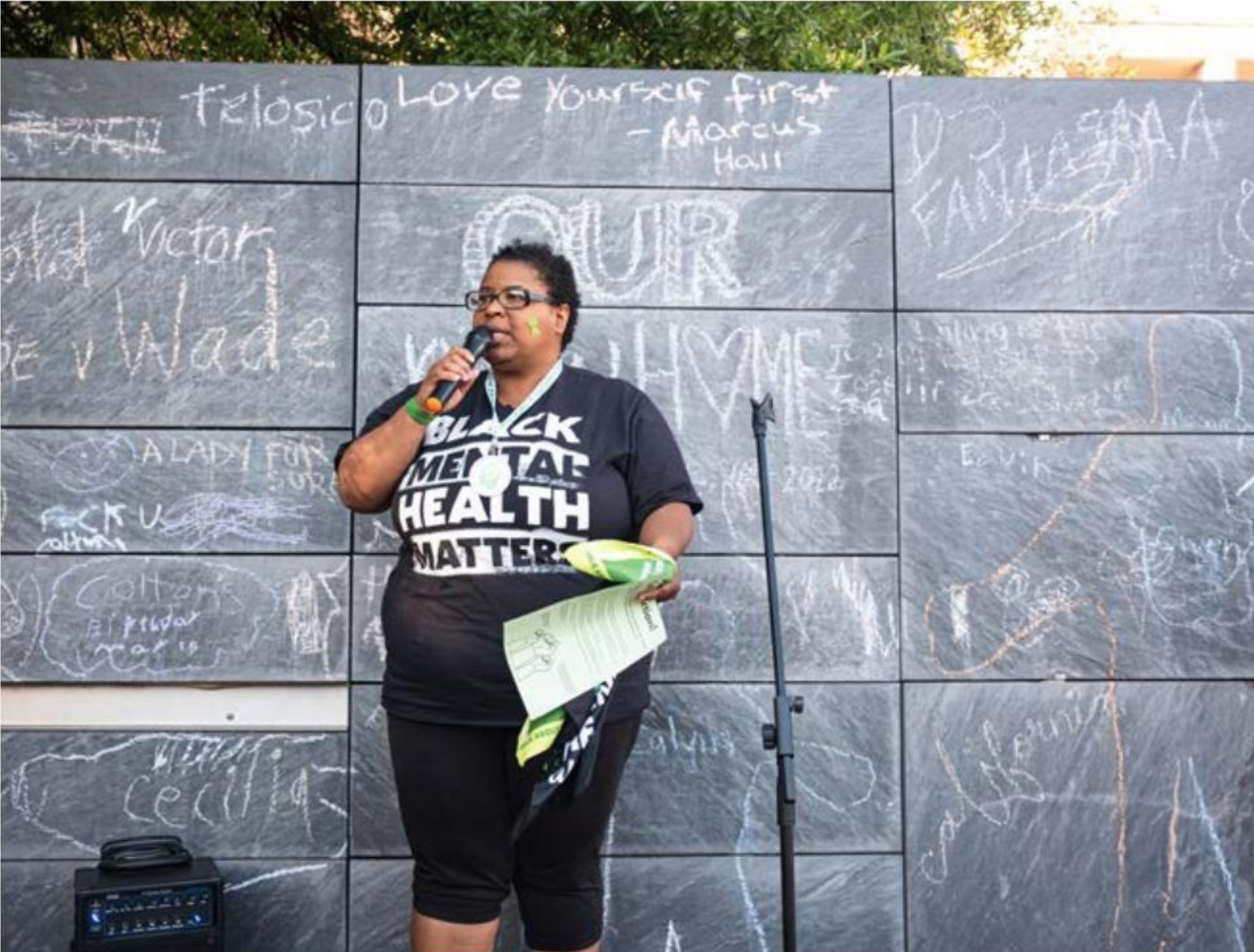By Maryann Xue and Brielle Entzminger
In the wake of 2020’s Black Lives Matter protests, the Virginia General Assembly passed the Marcus-David Peters Act. Named in honor of a 24-year-old Black high school biology teacher killed by a Richmond police officer during a severe mental health crisis in 2018, the 2020 law required localities to create a 9-8-8 number for mental health crises, and to develop protocols by July 2022 for when behavioral health experts, instead of law enforcement, will respond to crises related to mental health, substance use, and developmental disabilities.
Last year, the City of Charlottesville’s Marcus Alert work group began exploring how to develop the new mental health response system—but since then, little progress has been made on actually implementing it. Earlier this month, The People’s Coalition and Brave Souls On Fire held a rally in front of City Hall, calling on City Council to immediately establish a community-based response to mental health crises, completely separate from the Charlottesville Police Department, as well as create a 24/7 crisis center and new municipal department addressing community mental health needs, among other demands.
“What we don’t want is a situation where a person is in crisis, and it ends up being some type of preventable fatality,” said Myra Anderson, director of Brave Souls On Fire and co-chair of the Marcus Alert group, during the rally. “When you are in the depths of depression or despair, or having suicidal thoughts, and you reach out for help, we need to make sure as a community that that help is the right help you need.”
But with fluctuating deadlines and constantly evolving requirements, it currently remains unclear when the Marcus Alert system will be up and running in the Charlottesville area. In March, the Republican-majority General Assembly passed a bill allowing localities with populations of less than 40,000 to opt out of the system. Those with more than 40,000 residents are now required to implement the system by July 1, 2028—two years past the original deadline. Laws surrounding the Marcus Alert are expected to be reexamined during next year’s legislative session.
According to Sonny Saxton, executive director of the Charlottesville-UVA-Albemarle County Emergency Communications Center, the center has yet to hear back from the state’s Department of Behavioral Health and Developmental Services regarding the timeline and requirements for Charlottesville—which has around 46,600 residents—to implement the Marcus Alert. The system is currently available in only five localities across the state, including Prince William County, Richmond, and Virginia Beach.
“It will take time and substantial effort to ensure all these resource needs are met,” says Saxton. “Fortunately, we’ve also seen how there’s no lack of people who are eager to jump in and be intentional about this work. The need is clear, and now it is largely a question of staffing, resourcing, and coordinating logistics between all parties involved.”
The local emergency communications center sees the limits of its current system on a daily basis, explains Saxton. In instances where an individual needs to be placed in emergency custody, it is difficult to predict wait times for a staffed bed, or when and where medical attention will be available.
For Region Ten, which serves six localities including Charlottesville and Albemarle County, the current expectation is for the entire area to implement the Marcus Alert system, but it also remains unclear when that will happen, says Joanna Jennings, Region Ten community relations spokesperson.
This year, state lawmakers also extended the original July 1, 2021, deadline for localities to establish voluntary databases containing relevant mental health and emergency contact information to 2023—although in Charlottesville and Albemarle County, anyone who wishes to provide this information can already do so by calling Region Ten or the ECC’s non-emergency number (977-9041). In the case of a related 911 call, this information will be made available to the emergency responders dispatched to the scene.
However, nationwide changes to mental health crisis response are arriving soon. By July 16, anyone in the U.S. experiencing a mental health crisis will be able to call or text 988, and be connected right away with the National Suicide Prevention Lifeline, in accordance with a new Federal Communications Commission mandate.
Charlottesville, says City Councilor Michael Payne, cannot wait until 2028 to change its local response to mental health crises. This budget cycle, City Council allocated $100,000 toward the Marcus Alert system—an investment that Payne says needs to be connected to a coordinated plan.
“It is vital that the Emergency Communications Center, Charlottesville Police Department, and Charlottesville city government coordinate their efforts to position Charlottesville to be the next area where a Marcus Alert system is developed and implemented,” says Payne. “We need to be unified in laying the groundwork, making investments in our budget, conducting trainings…to allow us to hit the ground running.”
Payne emphasizes the importance of pursuing other avenues of non-police mental health responses as well. The Albemarle County Police Department recently opened a Crisis Intervention Team Assessment Center through a partnership with Region Ten, creating an environment for individuals experiencing mental health crises to receive proper care and assessment outside of the criminal justice system.
“When we conduct our search for the next chief of police, explicitly prioritizing implementation of these programs will be critical,” adds Payne. “There is a clear need in the community—we cannot just accept the bare minimum in terms of timelines and program scopes to improve our response to mental health needs.”
